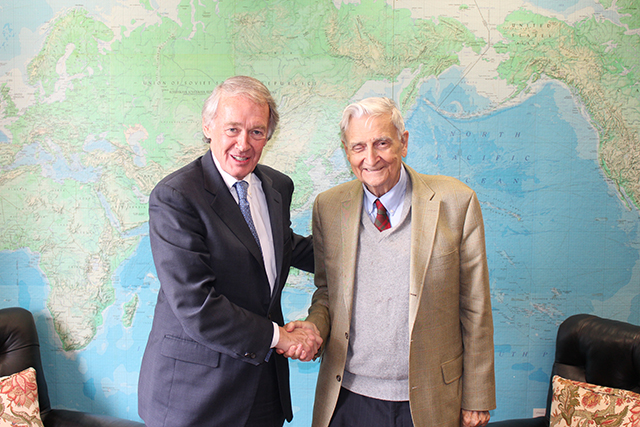Endangered Species: E.O. Wilson Visits Hill to Urge New Thinking on Conservation
By Amanda Reilly
Originally published in Environment & Energy Daily on May 19, 2016
Famed biologist and conservationist E.O. Wilson yesterday called for a “quantum leap” in efforts to save species from extinction.
At a Capitol Hill briefing, Wilson lauded efforts by global conservation organizations to protect species. But he said world attempts are falling short of what’s needed.
Of the approximately 20 percent of vertebrates in the world that scientists have characterized as vulnerable, Wilson said that only about a fifth on that “red list” have stabilized or begun to recover.
“That’s a tremendous achievement to this point, but it’s rather comparable to being in an emergency room where an accident victim is brought in, and a team of surgeons have stopped the bleeding, they’ve stopped 20 percent of the bleeding,” Wilson said. “So what are you to say to these ladies and gentlemen of the emergency room? Congratulations, the patient will be dead by morning.


Senator Edward J. Markey, left, and E.O. Wilson, Washington, DC, May 2016
“In other words, we lose him,” Wilson said at the briefing hosted by House Natural Resources Committee Democrats.
Wilson said he believes that saving the “living part of the world” seems to have dropped in priority as efforts to address climate change and live sustainably proliferate around the globe.
He appealed to an audience of congressional staff and conservationists to “think in much bigger terms” about the full array of life on Earth in their efforts to save species.
“We have to just get on with it and see if we can’t make a real quantum leap,” he said.
Until now, he said, there’s been a bias toward big animals when it comes to protecting species.
“Our focus has been so much on the big animals, what’s traditionally called wildlife, that we have neglected virtually all of the rest of life,” with the exception of flowering plants, he said. “Almost all of the rest of life on Earth has just been systematically ignored, even by most of us working in the realm of conservation or biology and the active process that includes both scientific and political action.”
Aaron Bernstein, associate director of the Center for Health and Global Environment at the Harvard T.H. Chan School of Public Health, echoed Wilson in saying that saving some of those species was vital to maintaining human health. He pointed to the Pacific yew, for example, which is used to treat some kinds of cancer.
Along with urging the protection of smaller species — including those at the microscopic level — Wilson called for a large-scale endeavor to better identify the full range of species that exist on Earth.
“One of the big projects that we should somehow stimulate everywhere in the world is to complete the discovery process,” he said, “so that we know what we’re talking about, we know what we’re dealing with. We’re moving mostly in the dark now.”
Wilson called habitat destruction the No. 1 threat facing living species.
In his recent book Half-Earth: Our Planet’s Fight for Life Wilson advocated for putting aside half of the Earth for nature preserves with the primary purpose of providing a safe haven for living things. The book argues that saving half the Earth for nature would protect 80 percent or more of all living species from extinction.
“Given that habitat destruction is unquestionably the main cause of species extinction in most parts of the world,” he said, “habitat is what we should, I think, involve ourselves in most urgently.”

